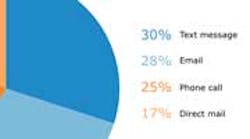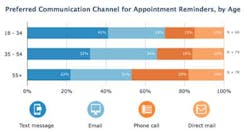Survey says … how dental patients prefer to be contacted
Knowing what patients want can be very helpful to dentists as far as gaining and retaining patients, and that includes how patients want to be contacted when it comes to appointment reminders or appointment scheduling.
Gaby Loria, a market researcher at Software Advice, a company that reviews practice management software, conducted a recent survey regarding how and when patients prefer to be contacted by their dental office.
“Since we strive to be a helpful resource for dental practices, we wanted to explore a challenge that most dentists could relate to facing on a regular basis,” Loria explained. “Missed appointments are a huge pain point for practices, so we thought some primary research could help dentists make the most of their strategies for boosting retention rates while keeping their schedules full.”
The company ran an online survey, and respondents were screened to ensure they had been to the dentist at least once in the past 30 months.
The findings? The greatest percentage of dental patients surveyed (30%) prefers receiving appointment reminders via text message.
It’s no surprise that the age of the person surveyed also plays a role in their preferences. Most patients over 34 years old (65%, combined) prefer receiving appointment reminders via email, and the age group with the highest preference for scheduling appointments online and through text message is 35 to 54 (a combined 16%).
There are still some “old fashioned” preferences, however, as 60% of patients prefer to schedule their next appointment while still at the dentist’s office. The remaining 40% prefer a phone call (30%), online via a patient portal such as the dentist’s website (7%), or text message (3%).
“Patients prefer these forms of contact because they are often easier to respond to than traditional outreach methods,” Loria said. “They don't have to abide by a set of business hours to engage with the practice instantaneously. The goal is for a practice to make it as convenient as possible for a patient to schedule a visit and actually come in for it.”
Fifty-three percent prefer to receive their reminders one to three days before their appointment, with four to six days following at 18%. Twenty-two percent prefer to receive no reminder, which of course is not a wise choice for the dental practice that wants to make sure patients remember their appointments.
Based on all these different results, Loria suggests that dental offices acquire software that allows the office to customize reminder time frames based on patient preference, as well as software solutions that can be customized from patient to patient – that is, software that sends automated reminders based on individual preferences.
Despite these findings, there are still many dentists who resist installing software systems that will allow them to become up to date via text and email. “There are a couple of factors at play for dentists who are hesitant about embracing this kind of technology,” Loria said. “The two most common concerns we've heard from potential software buyers are cost and ease of use. Both can be easily addressed with a little research about ROI and the right vendor's support/training. Dentists who don't stay up to date with this technology risk losing patients to practices that are better able to accommodate patient preferences.”
SOFTWARE ADVICE SURVEYS:
How dental patients use online reviews
Online dentist review use is climbing: Are you ready?
Is dental tourism threatening your practice?
What’s in store for Software Advice’s next survey? “We definitely have more reports in the works dealing with dentistry, software, and best practices,” Loria reports. “We go through a very thorough vetting and peer-review process to determine specific research topics, though, so we can't yet confirm what's coming down our pipeline. Stay tuned!”
Find out all the results at softwareadvice.com/dental/industryview.
About the Author

Meg Kaiser
Associate Editor
Meg Kaiser is an associate editor in Endeavor Business Media’s Dental Division. She works on DentistryIQ.com, RDH eVillage and RDH Graduate newsletters, Dental Economics magazine, and RDH magazine, and has for nearly 20 years. She knew she'd caught the dental bug when she began preaching oral-systemic health to everyone she met. Contact her at [email protected].

